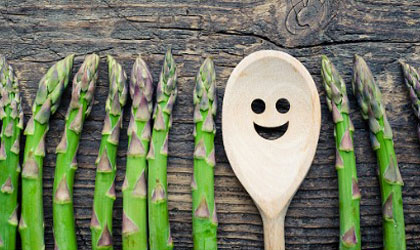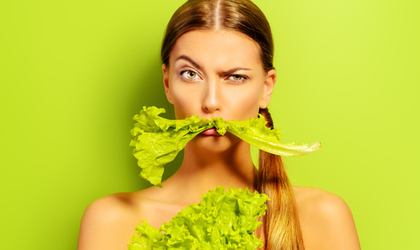
Though the TV ads and old wives’ tales will try to convince you that bone health is all about glugging milk and chowing down on cheese, this simply isn’t true. Sure – dairy is an abundant source of calcium, but some plant-sources are brimming with this mineral, too. Plus, getting enough calcium is only half the story. You also need the likes of vitamin D, protein, omega-3 fatty acids, and many more, to nourish bones. If you’re a vegan or follow a dairy-free diet, we want to reassure you that, with the correct application, you can indeed build strong bones with plants. Here are some of the most important nutrients you need to keep your eagle eye on.
Calcium
Best known for filling cheese and milk, calcium has been long associated with supporting bones, making it the biggest concern amongst vegans and dairy-free dieters. Let’s have a glance at the science: your body is continuously regulating your calcium levels; if the concentration in your muscles and blood is too low, the body will leach the mineral from your bones through a process called ‘resorption’. The result? Porous, weak, and brittle bones that are prone to fractures. Indeed, studies tell us poor calcium intake is directly associated with compromised bone mass density i. The good news? There’s more to calcium than the usual suspects: milk, cheese, and yoghurt. You can find an abundance of this mineral in the likes of kale, turnip greens, collards, which are immensely bioavailable, meaning your body can absorb and metabolise the calcium content well. Oh, and we never thought we’d utter these words, but watch out for spinach! It’s high in oxalate, which can inhibit calcium absorption. Legumes, nuts, seeds, tahini, calcium-set tofu, fortified bread, and dried fruits also deliver a hit of calcium. You should aim for 700mg of calcium every day.
Vitamin D
Typically found in animal-based products, vitamin D is another one vegans may struggle with. In fact, the EPIC-Oxford study revealed vegans experience the lowest vitamin D intake than any other eating regimen. This is a shocking statistic considering vitamin D is so essential to bone health. You see, vitamin D and calcium have a reciprocal relationship; calcium supports bones, and vitamin D supports optimal calcium absorption. Without it, your bone health will decline rapidly. Besides animal sources, the best next things for vegans are fortified foods, such as orange juice, breads, milk, and mushrooms (the only plant-based source of vitamin D, except for lichen plant extract which can be found in supplement form). Top tip: place your fungi on a bright windowsill and watch its vitamin D content soar. No, this isn’t magic – it’s the sun’s ultraviolet light working its power. And this leads us to the topic of sun exposure – and just how important it is. In addition to cramming more vitamin D food sources into your diet, ensure you get enough sunlight every day, too. When sunlight hits your skin, the body synthesizes vitamin D. Beaming sunshine isn’t always readily available in winter months, so the NHS and Public Health England recommend adding a Vitamin D3 supplement to your diet to cover any shortfalls.
Protein
Supporting calcium absorption and maintaining bone mass, protein is delicious bone food, too. According to one study, elderly women and men with poor protein intake experienced increased bone loss. As a vegan, you’ll naturally avoid the meat aisle and opt for plant-based protein instead. And you might be wondering if this puts you at a disadvantage? It seems not. In a 25-year study determining the risk of wrist fracture among premenopausal and postmenopausal women, researchers compared the consumption of plant protein to animal protein. Interestingly, the study concluded that plant protein delivered as much protection against wrist fractures as animal protein. Impressive, or what? To bolster your bones, focus on eating one serving of plant protein with every meal. Think quinoa, beans, lentils, oats, tofu, tempeh, and chia seeds. Top tip: combine legumes with whole grains to form a ‘complete’ protein, which delivers all the essential amino acids. Learn more about protein and bone health here.
Omega-3 fatty acids
A growing raft of data suggests omega 3 fatty acids are indispensable to bone health, playing a critical role in calcium balance and osteoblast activity – a process in which cells make bones. There are three types of omega 3 fatty acids: alpha-linolenic acid (AHA, eicosapentaenoic acid (EPA), and docosahexaenoic acid (DHA). Problem is that oily fish and seafood – top of the list of contraband for vegans – are the best sources of EPA and DHA. Therefore, it’s vitally important to eat a plentiful supply of the following foods to meet your omega 3 needs. Plant-based sources include walnuts, hemp seeds, flaxseeds, and chia seeds. Did you know just 28g of chia seeds meet your recommended daily allowance of omega 3 fatty acids, supplying a staggering 4,915mg? Since omega 3 levels are relatively low in vegan dietary sources, you may wish to consider a vegan omega 3 supplement.
Vitamin K2
Chances are you haven’t heard too much about vitamin K2. But this little-known nutrient can make a big difference to your bone health. Typically found in fermented foods, yoghurt, and ripe cheese, studies are consistently illuminating how essential vitamin K2 is for bone health. And it’s not surprising; this powerhouse supports bone formation, maintains calcium homeostasis, and protects against bone fractures. The richest vegan and lactose-free food source of vitamin K2 is natto – a Japanese fermented soy product. Sauerkraut, tempeh, and kombucha contain a small amount of this nutrient, too. You should aim for 90mcg of vitamin K2 each day.
On the bright side…
Despite the dearth of dairy, the good news is that vegan and dairy-free diets are usually abundant in nuts, seeds, whole grains, legumes, fruits, and veggies, which contain a smorgasbord of bone-bolstering nutrients, such as vitamin C, magnesium, and zinc. Take chickpeas, for instance. These fellas aren’t just a powerful source of plant protein; they also pack a ton of zinc and magnesium. While zinc plays a key role in collagen synthesis – a process that helps cultivate healthy bones – magnesium aids the production of the traditional bone-supporting nutrients, vitamin D and calcium. Discover more about which nutrients support bone health here.
Don’t forget
Vegans and those following dairy-free diets aren’t exempt from supporting bone health in other areas of life beyond diet. Exercise also needs to be a cornerstone of your bone supporting arsenal. In particular focus on weight-bearing activity, such as brisk walking, jogging, or dancing. This form of training is brilliant for building bones since it stimulates osteoblasts – cells that promote bone growth. Aim for three, 30-minutes, sessions every week. Because muscles and bones work in tandem, you should focus on improving flexibility and strength, too. Why start your day with a yoga flow or grab some weights after a run? (Learn more about exercising for bone health here.) Be mindful that smoking, drinking to excess, and guzzling countless cups of coffee will also conspire to hijack your bone health. Do yourself a favour and wash your hands of these vices! Your bones (and every other part of your body) will thank you for it.
References:
-
Kim. K., Choi. S., Lim. S., Moon. J., Kim. S., Kim. J., Jang. H. & Shin. C. (2014). Interactions Between Dietary Calcium Intake and Bone Mineral Density or Bone Geometry in a Low Calcium Intake Population (KNHANES IV 2008–2010). The Journal of Clinical Endocrinology & Metabolism. 99(7), 2409-2417.
-
Crowe. F., Steur. M., Allen. N., Appleby. P., Travis. R. & Key. T. (2010). Plasma concentrations of 25-hydroxyvitamin D in meat eaters, fish eaters, vegetarians and vegans: results from the EPIC–Oxford study. Public Health Nutrition. 14(02), 340-346.
-
Hannan. M., Tucker. K., Dawson-Hughes. B., Cupples. L., Felson. R. & Kiel. D. (2000). Effect of Dietary Protein on Bone Loss in Elderly Men and Women: The Framingham Osteoporosis Study. Journal of Bone and Mineral Research. 15(12), 2504-2512.
-
Thorpe. D., Knutsen. S., Lawrence Beeson. W., Rajaram. S. & Fraser. G. (2008). Effects of meat consumption and vegetarian diet on risk of wrist fracture over 25 years in a cohort of peri- and postmenopausal women. Public Health Nutrition. 11(6), 564-572.
-
Maggio. M., Artoni. A., Lauretani. F., Borghi. L., Nouvenne. A., Valenti. G. & Ceda. G. (2009). The Impact of Omega-3 Fatty Acids on Osteoporosis. Current Pharmaceutical Design. 15(36), 4157-4164.
-
Pearson. D. (2007). Bone Health and Osteoporosis: The Role of Vitamin K and Potential Antagonism by Anticoagulants. Nutrition in Clinical Practice. 22(5), 517-544.
You Might Also Like

Olivia
Olivia Salter has always been an avid health nut. After graduating from the University of Bristol, she began working for a nutritional consultancy where she discovered her passion for all things wellness-related. There, she executed much of the company’s content marketing strategy and found her niche in health writing, publishing articles in Women’s Health, Mind Body Green, Thrive and Psychologies.
View More



